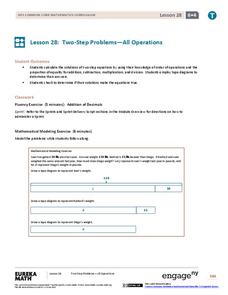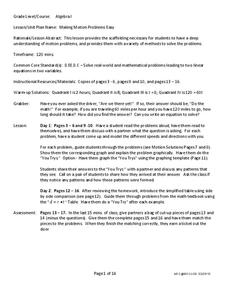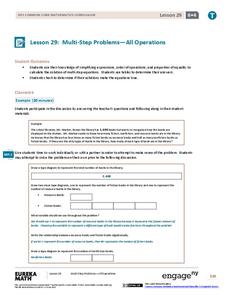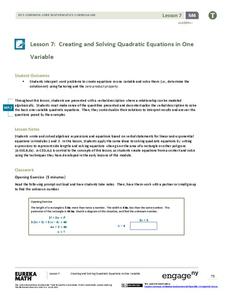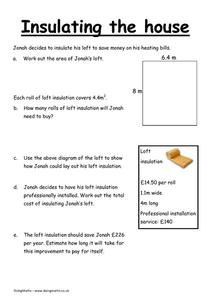Reardon Problem Solving Gifts
Teaching Problem Solving Strategies in the 5-12 Curriculum
Address any kind of math concept or problem with a series of problem-solving strategies. Over 12 days of different activities and increasing skills, learners practice different ways to solve problems, check their answers, and reflect...
Scholastic
Problem-Solving Strategies
Read carefully, look for key words, eliminate, estimate, check your answers. Give your youngsters the strategies for approaching multiple-choice problem solving, focusing on multiplication and division of whole numbers, with this...
Willow Tree
Problem Solving
School subjects connect when your young scholars use math to edit English. Math allows you to convert an entire paragraph into a simple equation or inequality. Examples encourage learners to write expressions, equations, and inequalities...
Lake Washington Institute of Technology
How To Work Word Problems in Algebra
Your algebra learners will pick up some solid algebra problem solving skills and a plan of approach for some typical types of word problems in this scripted worksheet that shows how to set up and organize each type of problem,...
Willow Tree
Weighted Averages
Mixtures, weighted percentages, and varying speeds make problem solving difficult. The resource give learners a strategy for tackling these types of problems effectively.
Missouri Department of Elementary
Opportunity Knocks, But It Costs, Too!
Sixth graders practice six steps to effective problem solving. Working with the school counselor, class members are presented with a scenario that requires them to make a decision. Individuals then write a reflection in which they...
EngageNY
Applying Tangents
What does geometry have to do with depression? It's an angle of course! Learners apply the tangent ratio to problem solving questions by finding missing lengths. Problems include angles of elevation and angles of depression. Pupils make...
EngageNY
Two-Step Problems—All Operations
Step 1: Use the resource. Step 2: Watch your class become experts in solving two-step problems. Scholars learn to solve two-step word problems in context. They use tape diagrams and algebraic techniques to break the problem into two,...
West Contra Costa Unified School District
Motion Problems
Let's hope class participants don't get motion sickness. In the lesson, class members first solve motion problems using tables and graphs. They then use algebraic techniques to solve motion problems.
EngageNY
Multi-Step Problems—All Operations
Harness the power of algebra to solve problems. Young mathematicians learn to work out multi-step problems by applying algebraic techniques, such as solving equations and proportions. They use tape diagrams to model the problem to finish...
Macmillan Education
Critical Thinking
Encourage learners to think deeply about the information they read or hear. Through a series of life skills worksheets, your pupils will consider the need for objectivity, identifying missing information, and problem solving.
Education Development Center
Thinking Things Through Thoroughly
Problem solving is a skill of its own. Learners use a variety of problems to encourage mental math and logic to get the correct answer. Guiding questions are provided along the way to encourage the right way of thinking to help tackle...
West Contra Costa Unified School District
Average Rate of Change
The concept of slope gets an approachable, yet theoretical, treatment in a comprehensive algebra lesson. The use of functional notation and problem-solving techniques keep the material rigorous, but detailed teaching notes and lots of...
EngageNY
Linear Systems in Three Variables
Put all that algebra learning to use! Using algebraic strategies, learners solve three-variable systems. They then use the three-variable systems to write a quadratic equation given three points on the parabola.
Doing Maths
Metric Measurements – Length
Seven word problems make up this metric learning exercise where scholars convert measurements and find the length of objects in real-world scenarios.
CK-12 Foundation
Using Quadratic Equations to Solve Problems: Construct a Soccer Field
Build a soccer field through a little mathematical analysis. Individuals manipulate the dimensions of a soccer field as they drag points to new positions. The simulation shows the corresponding intercepts and area. As pupils explore the...
EngageNY
Solve for Unknown Angles—Angles and Lines at a Point
How do you solve for an unknown angle? For this sixth installment of a 36-part series, young mathematicians use concepts learned in middle school geometry to set up and solve linear equations to find angle measures.
EngageNY
Applications of the Pythagorean Theorem
Begin seeing the world through the lens of geometry! Use the 19th installment in a 25-part module to apply the Pythagorean Theorem to solve real-world problems. Individuals sketch situations resulting in right triangles such as the...
EngageNY
Creating and Solving Quadratic Equations in One Variable
Give your classes practice at modeling using quadratic models with a resource that uses area and integer problems to allow individuals to create second degree polynomials. Young mathematicians solve equations using factoring and then...
CCSS Math Activities
Smarter Balanced Sample Items: 7th Grade Math – Target D
Put expressions, equations, and inequalities to work! Young scholars solve problems using various strategies. Meant as a snapshot of the Smarter Balanced Assessment, a set of seven questions includes topics from writing expressions to...
Doing Maths
Insulating the House
Finding the area of a rectangle is the focus of this metric worksheet. Here, mathematicians use their knowledge of finding the area of a shape in meters to discover how much material can fit inside a shape.
California Mathematics Project
For the Birds
It turns out math IS for the birds! Here, learners use mathematical reasoning to determine how often someone needs to fill a bird feeder. The rate the feeder empties varies by the number of holes that are available to the birds. Day two...
WE Charity
Elementary–Module 1: Sustainable Innovation
Where would society be without the innovations of Thomas Edison or Steve Jobs? Scholars explore what it means to have an innovative mindset. Working in small groups, pupils design a product or service to help solve a social,...
CK-12 Foundation
Inverse Variation Models: Speedometer for Inverse Variation Models
Model inverse variation while solving a real-world problem. Young scholars use the interactive lesson to discover the pattern of inverse variation data. They then use that discovery to write and analyze an equation.







